- Home
- Edith Wharton
The Choice Page 2
The Choice Read online
Page 2
“Hush!” he said, his lips on hers.
Suddenly she threw her head back and seemed to listen.
“What’s the matter? What do you hear?”
“I don’t know.” He felt her trembling. “I’m not sure this place is as safe as it used to be—”
Wrayford held her to him reassuringly. “But the boatman sleeps down at the village; and who else should come here at this hour?”
“Cobham might. He thinks of nothing but the launch.’”
“He won’t tonight. I told him I’d seen the skipper put her shipshape, and that satisfied him.”
“Ah—he did think of coming, then?”
“Only for a minute, when the sky looked so black half an hour ago, and he was afraid of a squall. It’s clearing now, and there’s no danger.”
He drew her down on the bench, and they sat a moment or two in silence, her hands in his. Then she said: “You’d better tell me.”
Wrayford gave a faint laugh. “Yes, I suppose I had. In fact, he asked me to.”
“He asked you to?”
“Yes.”
She uttered an exclamation of contempt. “He’s afraid!”
Wrayford made no reply, and she went on: “I’m not. Tell me everything, please.”
“Well, he’s chucked away a pretty big sum again—”
“How?”
“He says he doesn’t know. He’s been speculating, I suppose. The madness of making him your trustee!”
She drew her hands away. “You know why I did it. When we married I didn’t want to put him in the false position of the man who contributes nothing and accepts everything; I wanted people to think the money was partly his.”
“I don’t know what you’ve made people think; but you’ve been eminently successful in one respect. He thinks it’s all his—and he loses it as if it were.”
“There are worse things. What was it that he wished you to tell me?”
“That you’ve got to sign another promissory note—for fifty thousand this time.”
“Is that all?”
Wrayford hesitated; then he said: “Yes—for the present.”
She sat motionless, her head bent, her hand resting passively in his.
He leaned nearer. “What did you’ mean just now, by worse things?”
She hesitated. “Haven’t you noticed that he’s been drinking a great deal lately?”
“Yes; I’ve noticed.”
They were both silent; then Wrayford broke out, with sudden vehemence: “And yet you won’t—”
“Won’t?”
“Put an end to it. Good God! Save what’s left of your life.”
She made no answer, and in the stillness the throb of the water underneath them sounded like the beat of a tormented heart.
“Isabel—” Wrayford murmured. He bent over to kiss her. “Isabel! I can’t stand it! listen—”
“No; no. I’ve thought of everything. There’s the boy—the boy’s fond of him. He’s not a bad father.”
“Except in the trifling matter of ruining his son.”
“And there’s his poor old mother. He’s a good son, at any rate; he’d never hurt her. And I know her. If I left him, she’d never take a penny of my money. What she has of her own is not enough to live on; and how could he provide for her? If I put him out of doors, I should be putting his mother out too.”
“You could arrange that—there are always ways.”
“Not for her! She’s proud. And then she believes in him. Lots of people believe in him, you know. It would kill her if she ever found out.”
Wrayford made an impatient movement. “It will kill you if you stay with him to prevent her finding out.”
She laid her other hand on his. “Not while I have you.”
“Have me? In this way?”
“In any way.”
“My poor girl—poor child!”
“Unless you grow tired—unless your patience gives out.”
He was silent, and she went on insistently: “Don’t you suppose I’ve thought of that too—foreseen it?”
“Well—and then?” he exclaimed.
“I’ve accepted that too.”
He dropped her hands with a despairing gesture. “Then, indeed, I waste my breath!”
She made no answer, and for a time they sat silent again, a little between them. At length he asked: “You’re not crying?”
“No.”
“I can’t see your face, it’s grown so dark.”
“Yes. The storm must be coming.” She made a motion as if to rise.
He drew close and put his arm about her. “Don’t leave me yet. You know I must go to-morrow.” He broke off with a laugh. “I’m to break the news to you to-morrow morning, by the way; I’m to take you out in the motorlaunch and break it to you.” He dropped her hands and stood up. “Good God! How can I go and leave you here with him?”
“You’ve done it often.”
“Yes; but each time it’s more damnable. And then I’ve always had a hope—”
She rose also. “Give it up! Give it up!”
“You’ve none, then, yourself?”
She was silent, drawing the folds of her cloak about her.
“None—none?” he insisted.
He had to bend his head to hear her answer. “Only one!”
“What, my dearest? What?”
“Don’t touch me! That he may die!”
They drew apart again, hearing each other’s quick breathing through the darkness.
“You wish that too?” he said.
“I wish it always—every day, every hour, every moment!” She paused, and then let the words break from her. “You’d better know it; you’d better know the worst of me. I’m not the saint you suppose; the duty I do is poisoned by the thoughts I think. Day by day, hour by hour, I wish him dead. When he goes out I pray for something to happen; when he comes back I say to myself: ‘Are you here again?’ When I hear of people being killed in accidents, I think: ‘Why wasn’t he there?’ When I read the death-notices in the paper I say: ‘So-and-so was just his age.’ When I see him taking such care of his health and his diet—as he does, you know, except when he gets reckless and begins to drink too much—when I see him exercising and resting, and eating only certain things, and weighing himself, and feeling his muscles, and boasting that he hasn’t gained a pound, I think of the men who die from overwork, or who throw their lives away for some great object, and I say to myself: ‘What can kill a man who thinks only of himself?’ And night after night I keep myself from going to sleep for fear I may dream that he’s dead. When I dream that, and wake and find him there it’s worse than ever—”
She broke off with a sob, and the loud lapping of the water under the floor was like the beat of a rebellious heart.
“There, you know the truth!” she said.
He answered after a pause: “People do die.”
“Do they?” She laughed. “Yes—in happy marriages!”
They were silent again, and Isabel turned, feeling her way toward the door. As she did so, the profound stillness was broken by the sound of a man’s voice trolling out unsteadily the refrain of a music-hall song.
The two in the boathouse darted toward each other with a simultaneous movement, clutching hands as they met.
“He’s coming!” Isabel said.
Wrayford disengaged his hands.
“He may only be out for a turn before he goes to bed. Wait a minute. I’ll see.” He felt his way to the bench, scrambled up on it, and stretching his body forward managed to bring his eyes in line with the opening above the door.
“It’s as black as pitch. I can’t see anything.”
The refrain rang out nearer.
“Wait! I saw something twinkle. There it is again. It’s his cigar. It’s coming this way—down the path.”
There was a long rattle of thunder through the stillness.
“It’s the storm!” Isabel whispered. “He’s coming to see about the launch.”
Wrayford dropped noiselessly from the bench and she caught him by the arm.
“Isn’t there time to get up the path and slip under the shrubbery?”
“No, he’s in the path now. He’ll be here in two minutes. He’ll find us.”
He felt her hand tighten on his arm.
“You must go in the skiff, then. It’s the only way.”
“And let him find you? And hear my oars? Listen—there’s something I must say.”
She flung her arms about him and pressed her face to his.
“Isabel, just now I didn’t tell you everything. He’s ruined his mother—taken everything of hers too. And he’s got to tell her; it can’t be kept from her.”
She uttered an incredulous exclamation and drew back.
“Is this the truth? Why didn’t you tell me before?”
“He forbade me. You were not to know.”
Close above them, in the shrubbery, Stilling warbled:
“Nita, Juanita, Ask thy soul if we must part!”
Wrayford held her by both arms. “Understand this—if he comes in, he’ll find us. And if there’s a row you’ll lose your boy.”
She seemed not to hear him. “You—you—you—he’ll kill you!” she exclaimed.
Wrayford laughed impatiently and released her, and she stood shrinking against the wall, her hands pressed to her breast. Wrayford straightened himself and she felt that he was listening intently. Then he dropped to his knees and laid his hands against the boards of the sliding floor. It yielded at once, as if with a kind of evil alacrity; and at their feet they saw, under the motionless solid night, another darker night that moved and shimmered. Wrayford threw himself back against the opposite wall, behind the door.
A key rattled in the lock, and after a moment’s fumbling the door swung open. Wrayford and Isabel saw a man’s black bulk against the obscurity. It moved a step, lurched forward, and vanished out of sight. From the depths beneath them there came a splash and a long cry.
“Go! go!” Wrayford cried out, feeling blindly for Isabel in the blackness.
“Oh—” she cried, wrenching herself away from him.
He stood still a moment, as if dazed; then she saw him suddenly plunge from her side, and heard another splash far down, and a tumult in the beaten water.
In the darkness she cowered close to the opening, pressing her face over the edge, and crying out the name of each of the two men in turn. Suddenly she began to see: the obscurity was less opaque, as if a faint moon-pallor diluted it. Isabel vaguely discerned the two shapes struggling in the black pit below her; once she saw the gleam of a face. She glanced up desperately for some means of rescue, and caught sight of the oars ranged on brackets against the wall. She snatched down the nearest, bent over the opening, and pushed the oar down into the blackness, crying out her husband’s name.
The clouds had swallowed the moon again, and she could see nothing below her; but she still heard the tumult in the beaten water.
“Cobham! Cobham!” she screamed.
As if in answer, she felt a mighty clutch on the oar, a clutch that strained her arms to the breaking-point as she tried to brace her knees against the runners of the sliding floor.
“Hold on! Hold on! Hold on!” a voice gasped out from below; and she held on, with racked muscles, with bleeding palms, with eyes straining from their sockets, and a heart that tugged at her as the weight was tugging at the oar.
Suddenly the weight relaxed, and the oar slipped up through her lacerated hands. She felt a wet body scrambling over the edge of the opening, and Stilling’s voice, raucous and strange, groaned out, close to her: “God! I thought I was done for.”
He staggered to his knees, coughing and sputtering, and the water dripped on her from his streaming clothes.
She flung herself down, again, straining over the pit. Not a sound came up from it.
“Austin! Austin! Quick! Another oar!” she shrieked.
Stilling gave a cry. “My God! Was it Austin? What in hell—Another oar? No, no; untie the skiff, I tell you. But it’s no use. Nothing’s any use. I felt him lose hold as I came up.”
*****
After that she was conscious of nothing till, hours later, as it appeared to her, she became dimly aware of her husband’s voice, high, hysterical and important, haranguing a group of scared lantern-struck faces that had sprung up mysteriously about them in the night.
“Poor Austin! Poor Wrayford… terrible loss to me… mysterious dispensation. Yes, I do feel gratitude—miraculous escape—but I wish old Austin could have known that I was saved!”
End of the Project Gutenberg EBook of The Choice, by Edith Wharton
*** END OF THIS PROJECT GUTENBERG EBOOK THE CHOICE ***
***** This file should be named 24348.txt or 24348.zip ***** This and all associated files of various formats will be found in: http://www.gutenberg.org/2/4/3/4/24348/
Produced by David Widger
Updated editions will replace the previous one—the old editions will be renamed.
Creating the works from public domain print editions means that no one owns a United States copyright in these works, so the Foundation (and you!) can copy and distribute it in the United States without permission and without paying copyright royalties. Special rules, set forth in the General Terms of Use part of this license, apply to copying and distributing Project Gutenberg-tm electronic works to protect the PROJECT GUTENBERG-tm concept and trademark. Project Gutenberg is a registered trademark, and may not be used if you charge for the eBooks, unless you receive specific permission. If you do not charge anything for copies of this eBook, complying with the rules is very easy. You may use this eBook for nearly any purpose such as creation of derivative works, reports, performances and research. They may be modified and printed and given away—you may do practically ANYTHING with public domain eBooks. Redistribution is subject to the trademark license, especially commercial redistribution.
*** START: FULL LICENSE ***
THE FULL PROJECT GUTENBERG LICENSE PLEASE READ THIS BEFORE YOU DISTRIBUTE OR USE THIS WORK
To protect the Project Gutenberg-tm mission of promoting the free distribution of electronic works, by using or distributing this work (or any other work associated in any way with the phrase “Project Gutenberg”), you agree to comply with all the terms of the Full Project Gutenberg-tm License (available with this file or online at http://gutenberg.org/license).
Section 1. General Terms of Use and Redistributing Project Gutenberg-tm electronic works
1.A. By reading or using any part of this Project Gutenberg-tm electronic work, you indicate that you have read, understand, agree to and accept all the terms of this license and intellectual property (trademark/copyright) agreement. If you do not agree to abide by all the terms of this agreement, you must cease using and return or destroy all copies of Project Gutenberg-tm electronic works in your possession. If you paid a fee for obtaining a copy of or access to a Project Gutenberg-tm electronic work and you do not agree to be bound by the terms of this agreement, you may obtain a refund from the person or entity to whom you paid the fee as set forth in paragraph 1.E.8.
1.B. “Project Gutenberg” is a registered trademark. It may only be used on or associated in any way with an electronic work by people who agree to be bound by the terms of this agreement. There are a few things that you can do with most Project Gutenberg-tm electronic works even without complying with the full terms of this agreement. See paragraph 1.C below. There are a lot of things you can do with Project Gutenberg-tm electronic works if you follow the terms of this agreement and help preserve free future access to Project Gutenberg-tm electronic works. See paragraph 1.E below.
1.C. The Project Gutenberg Literary Archive Foundation (“the Foundation” or PGLAF), owns a compilation copyright in the collection of Project Gutenberg-tm electronic works. Nearly all the individual works in the collection are in the public domain in the United States. If an individual work is in the public domain in the
United States and you are located in the United States, we do not claim a right to prevent you from copying, distributing, performing, displaying or creating derivative works based on the work as long as all references to Project Gutenberg are removed. Of course, we hope that you will support the Project Gutenberg-tm mission of promoting free access to electronic works by freely sharing Project Gutenberg-tm works in compliance with the terms of this agreement for keeping the Project Gutenberg-tm name associated with the work. You can easily comply with the terms of this agreement by keeping this work in the same format with its attached full Project Gutenberg-tm License when you share it without charge with others.
1.D. The copyright laws of the place where you are located also govern what you can do with this work. Copyright laws in most countries are in a constant state of change. If you are outside the United States, check the laws of your country in addition to the terms of this agreement before downloading, copying, displaying, performing, distributing or creating derivative works based on this work or any other Project Gutenberg-tm work. The Foundation makes no representations concerning the copyright status of any work in any country outside the United States.
1.E. Unless you have removed all references to Project Gutenberg:
1.E.1. The following sentence, with active links to, or other immediate access to, the full Project Gutenberg-tm License must appear prominently whenever any copy of a Project Gutenberg-tm work (any work on which the phrase “Project Gutenberg” appears, or with which the phrase “Project Gutenberg” is associated) is accessed, displayed, performed, viewed, copied or distributed:
This eBook is for the use of anyone anywhere at no cost and with almost no restrictions whatsoever. You may copy it, give it away or re-use it under the terms of the Project Gutenberg License included with this eBook or online at www.gutenberg.org
1.E.2. If an individual Project Gutenberg-tm electronic work is derived from the public domain (does not contain a notice indicating that it is posted with permission of the copyright holder), the work can be copied and distributed to anyone in the United States without paying any fees or charges. If you are redistributing or providing access to a work with the phrase “Project Gutenberg” associated with or appearing on the work, you must comply either with the requirements of paragraphs 1.E.1 through 1.E.7 or obtain permission for the use of the work and the Project Gutenberg-tm trademark as set forth in paragraphs 1.E.8 or 1.E.9.

 The Age of Innocence
The Age of Innocence The Reef
The Reef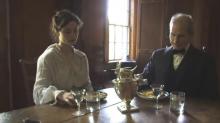 Summer
Summer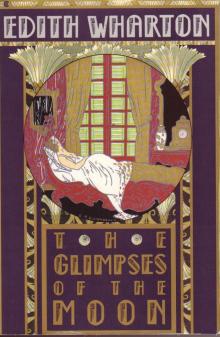 The Glimpses of the Moon
The Glimpses of the Moon Xingu
Xingu The Fruit of the Tree
The Fruit of the Tree Fast and Loose
Fast and Loose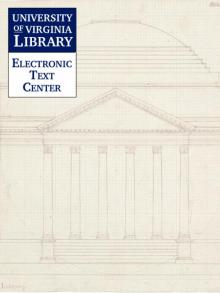 Artemis to Actaeon and Other Verse
Artemis to Actaeon and Other Verse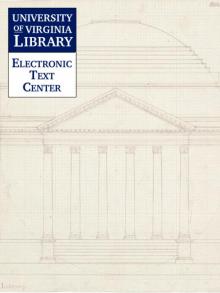 The Line of Least Resistance
The Line of Least Resistance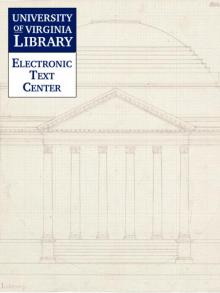 The Lamp of Psyche
The Lamp of Psyche The Reckoning
The Reckoning Afterward
Afterward The New York Stories of Edith Wharton
The New York Stories of Edith Wharton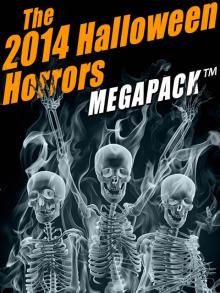 The 2014 Halloween Horrors Megapack
The 2014 Halloween Horrors Megapack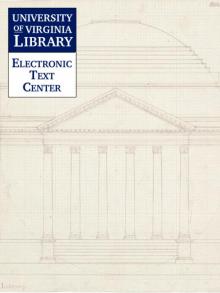 'Copy': A Dialogue
'Copy': A Dialogue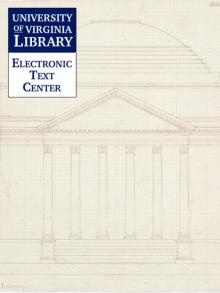 The Recovery
The Recovery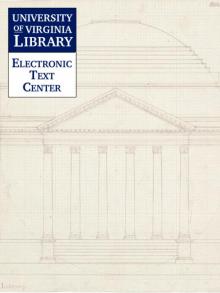 The Fulness of Life
The Fulness of Life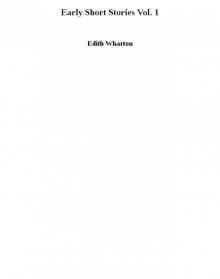 Early Short Stories Vol. 1
Early Short Stories Vol. 1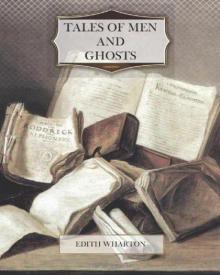 Tales of Men and Ghosts
Tales of Men and Ghosts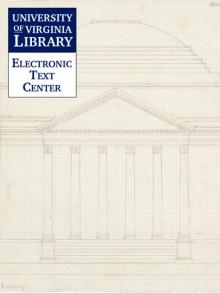 The House of the Dead Hand
The House of the Dead Hand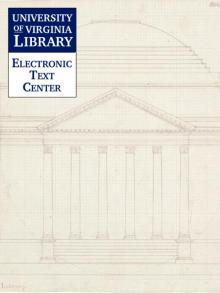 That Good May Come
That Good May Come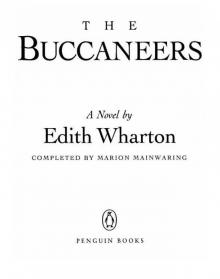 The Buccaneers
The Buccaneers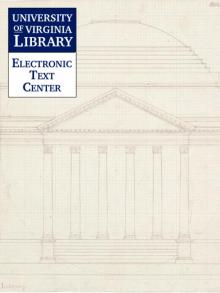 Other Times, Other Manners
Other Times, Other Manners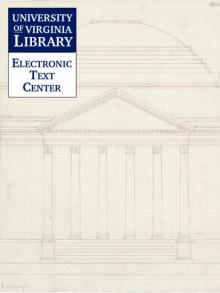 The Hermit and the Wild Woman
The Hermit and the Wild Woman Kerfol
Kerfol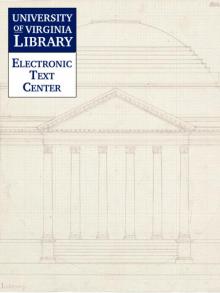 The Duchess at Prayer
The Duchess at Prayer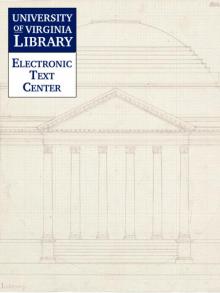 Bunner Sisters
Bunner Sisters The Choice
The Choice Madame De Treymes
Madame De Treymes Ethan Frome, Summer, Bunner Sisters
Ethan Frome, Summer, Bunner Sisters In Morocco
In Morocco The Valley of Decision
The Valley of Decision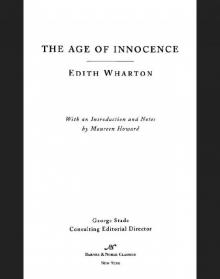 Age of Innocence (Barnes & Noble Classics Series)
Age of Innocence (Barnes & Noble Classics Series)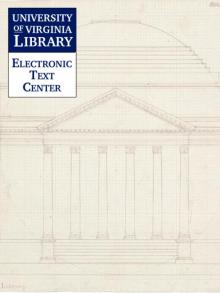 The Angel at the Grave
The Angel at the Grave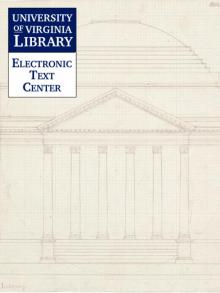 April Showers
April Showers Sanctuary
Sanctuary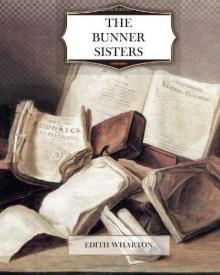 The Bunner Sisters
The Bunner Sisters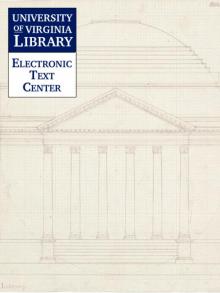 Mrs. Manstey's View
Mrs. Manstey's View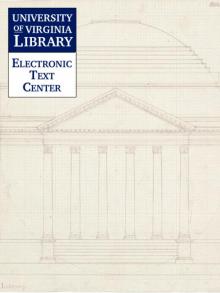 Writing a War Story
Writing a War Story The Custom of the Country
The Custom of the Country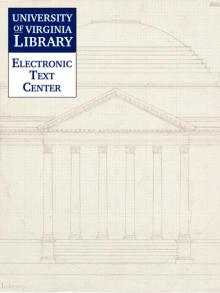 In Trust
In Trust The Triumph of the Night
The Triumph of the Night The Hermit and the Wild Woman, and Other Stories
The Hermit and the Wild Woman, and Other Stories Roman Fever and Other Stories
Roman Fever and Other Stories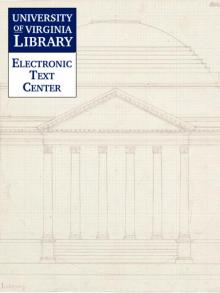 The Mission of Jane
The Mission of Jane The Descent of Man and Other Stories
The Descent of Man and Other Stories Coming Home
Coming Home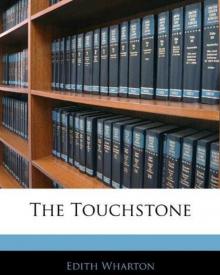 The Touchstone
The Touchstone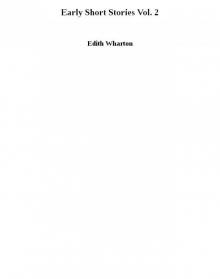 Early Short Stories Vol. 2
Early Short Stories Vol. 2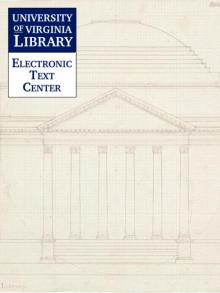 Edith Wharton's Verse, 1879-1919, from various journals.
Edith Wharton's Verse, 1879-1919, from various journals.